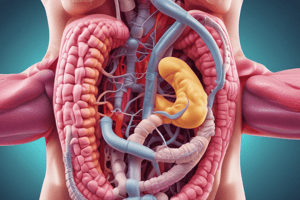Podcast
Questions and Answers
Patients with a prior history of abdominal surgery, particularly in the pelvic region, are at a higher risk of developing intraabdominal adhesions due to:
Patients with a prior history of abdominal surgery, particularly in the pelvic region, are at a higher risk of developing intraabdominal adhesions due to:
- A decrease in inflammatory response in the abdominal cavity
- Increased peristalsis in the bowel leading to adhesions formation
- Chronic inflammation from previous surgeries (correct)
- Genetic predisposition to bowel adhesions
Which factor increases the risk of developing hypotonic bowel in patients?
Which factor increases the risk of developing hypotonic bowel in patients?
- Regular physical activity
- Consuming a high-fiber diet
- Taking antibiotics
- Being on bed rest (correct)
How do bowel obstruction, strangulation, and perforation lead to hypovolemia?
How do bowel obstruction, strangulation, and perforation lead to hypovolemia?
- By reducing electrolyte balance
- By increasing fluid intake
- By enhancing intravascular volume
- Through vomiting and diarrhea causing fluid losses (correct)
What is the main cause of sepsis in cases of perforated bowel?
What is the main cause of sepsis in cases of perforated bowel?
How does multisystem organ dysfunction syndrome primarily contribute to increased mortality?
How does multisystem organ dysfunction syndrome primarily contribute to increased mortality?
What physiologic concern is associated with toxic megacolon?
What physiologic concern is associated with toxic megacolon?
What are the typical signs and symptoms of bowel obstruction?
What are the typical signs and symptoms of bowel obstruction?
What physiologic manifestation is associated with bowel perforation?
What physiologic manifestation is associated with bowel perforation?
Why is toxic megacolon more likely to occur in critically ill patients undergoing aggressive antibiotic therapy?
Why is toxic megacolon more likely to occur in critically ill patients undergoing aggressive antibiotic therapy?
What are the implications of aggressive resuscitation in cases of toxic megacolon?
What are the implications of aggressive resuscitation in cases of toxic megacolon?
Why is it important to consider preoperative data and preexisting comorbidities for fluid management in patients undergoing bowel resection surgery?
Why is it important to consider preoperative data and preexisting comorbidities for fluid management in patients undergoing bowel resection surgery?
What consequences can occur due to fluid losses caused by vomiting and diarrhea in patients undergoing bowel resection surgery?
What consequences can occur due to fluid losses caused by vomiting and diarrhea in patients undergoing bowel resection surgery?
How does bowel obstruction contribute to the failure in barrier function during bowel resection surgery?
How does bowel obstruction contribute to the failure in barrier function during bowel resection surgery?
What is a potential benefit of administering oral antibiotics in combination with mechanical bowel preparation (MBP) for patients undergoing elective intraabdominal surgery?
What is a potential benefit of administering oral antibiotics in combination with mechanical bowel preparation (MBP) for patients undergoing elective intraabdominal surgery?
What physiological consequences may malnourished or medically compromised patients face as a result of preoperative bowel preparation for surgery?
What physiological consequences may malnourished or medically compromised patients face as a result of preoperative bowel preparation for surgery?
Which modality may be employed effectively as a primary modality or as a supplement to an epidural technique for postoperative analgesia after laparotomy?
Which modality may be employed effectively as a primary modality or as a supplement to an epidural technique for postoperative analgesia after laparotomy?
What may effectively decrease postoperative opioid requirements and has shown analgesic properties in patients undergoing laparotomy?
What may effectively decrease postoperative opioid requirements and has shown analgesic properties in patients undergoing laparotomy?
What approach, if instituted, may significantly decrease the degree of postoperative pain after laparotomy?
What approach, if instituted, may significantly decrease the degree of postoperative pain after laparotomy?
Which medication, when administered in low IV doses, effectively augments the effect of opioids for postoperative pain management?
Which medication, when administered in low IV doses, effectively augments the effect of opioids for postoperative pain management?
What technique anesthetizes sensory nerves of the anterior abdominal wall and can be utilized for postoperative analgesia after laparotomy?
What technique anesthetizes sensory nerves of the anterior abdominal wall and can be utilized for postoperative analgesia after laparotomy?
Flashcards are hidden until you start studying


